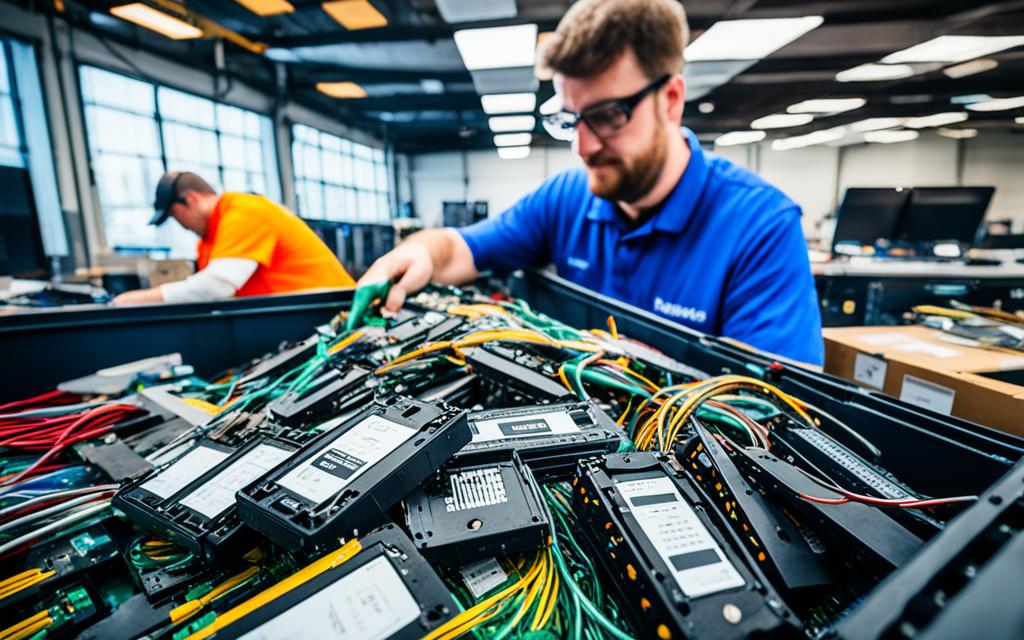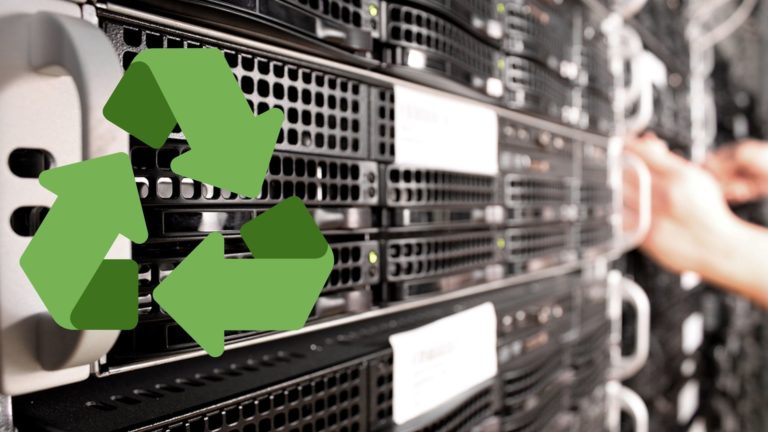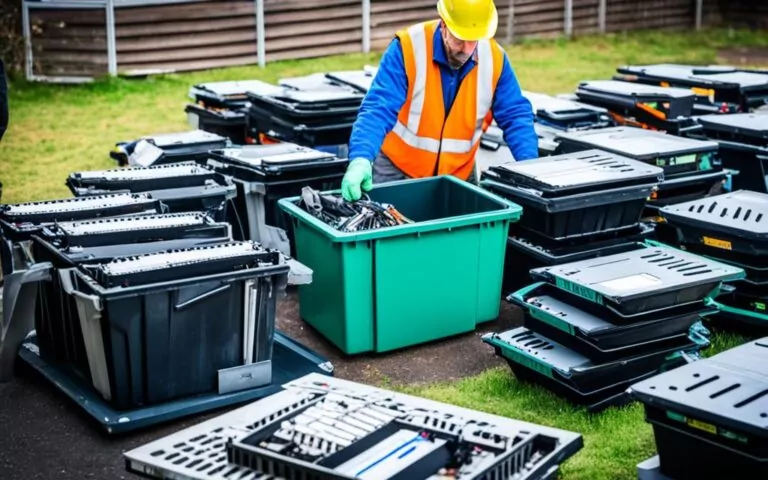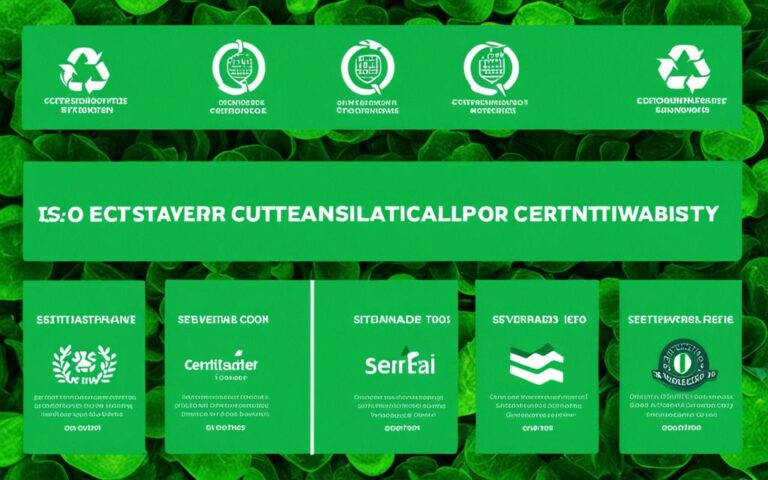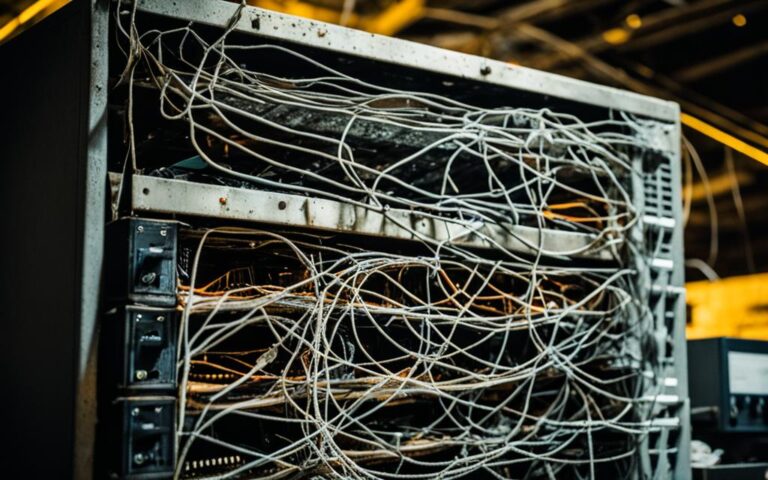The Potential of Blockchain in Tracking Recycled Servers
Imagine a world where every recycled server can be traced, its journey from disposal to rebirth fully transparent. Blockchain technology has the potential to make this vision a reality. By leveraging blockchain’s decentralized and transparent nature, the recycling industry can revolutionize the way it tracks, monitors and manages recycled servers, ensuring sustainability and traceability every step of the way.
In a world that generates over 2 billion tonnes of solid waste annually, the need for eco-friendly tech practices has never been greater. The lack of transparency in waste tracking has created opportunities for illegal waste trade, undermining efforts towards sustainability. Blockchain technology can address this challenge by providing a trusted and permanent ledger system that enables accurate tracking and recording of recycled servers throughout their lifecycle, reducing the environmental impact of electronic waste.
The potential of blockchain in tracking recycled servers goes beyond mere traceability. By incentivizing participation and collaboration in the recycling industry, blockchain technology can stimulate social inclusion and maximize recycling performance. Companies like PlasticBank, Empower, and Kabidiwalla Connect have already embraced blockchain by implementing self-executing smart contracts and digital currencies, motivating waste collection and tracking. These innovative approaches not only enhance the credibility of recycling information but also contribute to the development of a closed-loop circular economy.
In a world where sustainability is paramount, blockchain’s potential in tracking recycled servers is undeniable. It offers a pathway towards a more transparent, efficient, and eco-friendly recycling industry. By embracing this technology, we can pave the way for a future where recycled servers play a vital role in sustaining our environment and building a circular economy.
The Role of Blockchain in Recycling Chains
The traditional recycling industry faces significant challenges due to linear and fragmented recycling chains that hinder progress towards a Circular Economy. Lack of transparency in waste tracking leads to evasion of recycling responsibility and opportunities for illegal waste trade. However, blockchain technology holds the potential to revolutionize recycling chains, providing transparency and trust through its decentralized and permanent ledger system.
By integrating blockchain technology into their operations, recycling companies can stimulate collaboration, increase recycling performance, extend producer responsibility, and achieve better sustainability reporting. Platforms such as PlasticBank, Empower, and Kabidiwalla Connect enable collectors to earn digital currency for their recycling work, stimulating participation and social inclusion. These platforms also allow for better tracking and integration of waste flow, improving recycling chain efficiency and accountability.
“Blockchain technology has the power to transform the recycling industry by providing transparent and traceable data, enabling collaboration among stakeholders, and driving recycling performance to new heights.” – CEO of PlasticBank
With blockchain, every step of the recycling process can be recorded and verified, ensuring transparency and accountability. Waste tracking becomes seamless, making it easier to identify bottlenecks and inefficiencies in the recycling chain. This technology empowers consumers, businesses, and regulators to make informed decisions about their recycling practices, ensuring that waste is properly managed and resources are utilized efficiently.
The Benefits of Blockchain in Recycling Chains
Blockchain technology offers a wide range of benefits in the context of recycling chains:
- Transparency: Blockchain provides a tamper-proof and transparent record of every transaction, enabling all stakeholders to access and verify information. This transparency encourages accountability and helps prevent illegal waste dumping and fraudulent activities.
- Collaboration: By leveraging blockchain, recycling companies, waste collectors, and consumers can collaborate more effectively. Blockchain-based platforms facilitate direct communication, incentivize participation, and foster a sense of shared responsibility among participants.
- Recycling Performance: Blockchain technology enables the collection and analysis of detailed data throughout the recycling chain. This data can be used to identify areas for improvement, optimize processes, and enhance overall recycling performance.
By harnessing the power of blockchain, the recycling industry can overcome its current challenges and take a significant step towards achieving a sustainable and circular economy.
| Challenges in Traditional Recycling Chains | Benefits of Blockchain Integration | |
|---|---|---|
| Transparency | Lack of transparency in waste tracking allows for illegal waste trade and evasion of recycling responsibility. | Blockchain ensures transparency in waste tracking, preventing illegal activities and fostering accountability. |
| Collaboration | Fragmented recycling chains hinder collaboration among stakeholders. | Blockchain-based platforms facilitate collaboration, incentivize participation, and foster shared responsibility. |
| Recycling Performance | Linear recycling chains limit the potential for optimization and improvement. | Blockchain enables the collection and analysis of data, allowing for better recycling performance. |
Blockchain’s Impact on Reducing E-waste
Electronic waste, or e-waste, has become the world’s fastest-growing domestic waste stream, with approximately 53.6 million metric tons generated in 2019 alone. The production of a single smartphone can result in emissions of up to 85 kilograms of carbon dioxide equivalent (CO2e). The environmental impact of electronic waste is significant and calls for innovative solutions.
Blockchain technology, with its decentralized and transparent nature, offers a promising solution to reduce e-waste and create a circular economy for devices. By leveraging blockchain, we can enable the tracking and tracing of a device’s lifecycle, providing valuable information about its origin, usage, and disposal. This transparency boosts consumer trust in used devices and reduces the need for new phone production, ultimately reducing the environmental footprint of the mobile phone industry.
By streamlining refurbishment, recycling, and resell processes, blockchain can have a transformative impact on e-waste management. This technology ensures faster turnaround times, lower costs, and more opportunities for participants in the mobile industry to contribute to a sustainable future. With blockchain, the mobile industry can embrace a circular economy approach, extending the lifespan of devices and reducing electronic waste.
Let’s take a closer look at the potential benefits of blockchain in reducing e-waste:
- Traceability: Blockchain enables the transparent tracking and tracing of a device’s journey from production to disposal. This traceability not only allows consumers to verify the origin and authenticity of used devices but also provides valuable data for recyclers and regulators to optimize the recycling process.
- Extended Lifespan: By promoting the reselling and refurbishment of used devices, blockchain encourages consumers to make sustainable choices. Extending the lifespan of a mobile phone from 18 months to four years, for example, could result in a 40% reduction in CO2e emissions.
- Reduction in Emissions: With blockchain’s ability to incentivize the reuse and recycling of devices, carbon emissions associated with manufacturing new phones can be significantly reduced. This contributes to a more sustainable and eco-friendly approach to electronic devices.
- Improved Efficiency: By streamlining the refurbishment, recycling, and resell processes, blockchain eliminates unnecessary delays and complexities in e-waste management. This leads to faster turnaround times, lower costs, and greater efficiency in resource allocation.
Blockchain technology holds great promise in tackling the environmental impact of e-waste and fostering a circular economy for electronic devices. Its transparency, traceability, and efficiency can drive sustainable practices in the mobile industry and reduce the reliance on new device production.
“Blockchain enables the transparent tracking and tracing of a device’s lifecycle, reducing e-waste and fostering a more sustainable future.”
Challenges and Barriers to Blockchain Adoption in the Recycling Industry
While blockchain technology has the potential to revolutionize the recycling industry, there are still barriers to its widespread adoption. Integrating blockchain into operations requires overcoming several challenges and concerns:
- Complexity: Businesses hesitate to adopt blockchain due to concerns about its complexity and the need for technical expertise.
- Unclear risks and benefits: Some companies are unsure about the risks and benefits associated with implementing blockchain technology in the recycling industry.
- Additional costs: Integrating blockchain technology may require additional investments in infrastructure, software, and training.
- Lack of standardization: Currently, each manufacturer uses its own proprietary systems and software for tracking waste flows, creating a lack of interoperability and standardization.
- Consumer behavior and trust: Many consumers still prefer to buy new devices rather than used ones, and there is skepticism around the performance and quality of second-hand devices.
Overcoming these barriers is crucial for the widespread adoption of blockchain in the recycling industry. It requires collaboration between industry stakeholders, addressing concerns, and educating consumers about the benefits of recycling and using blockchain technology.
“Blockchain has the potential to transform the recycling industry, but we must overcome the challenges and barriers to adoption. By working together, we can create a sustainable future and leverage blockchain’s power for a circular economy.”
By addressing these challenges, the recycling industry can leverage blockchain’s capabilities to improve transparency, traceability, and efficiency in waste management, ultimately enabling a more sustainable and eco-friendly future.
Barriers to Blockchain Adoption in the Recycling Industry
| Challenges | Solutions |
|---|---|
| Complexity | Provide training and technical support to help businesses integrate blockchain technology |
| Unclear risks and benefits | Educate industry stakeholders about the potential benefits and risks of adopting blockchain in recycling |
| Additional costs | Explore cost-effective solutions and incentivize investments in blockchain integration |
| Lack of standardization | Foster collaboration between manufacturers for the development of standardized systems and software |
| Consumer behavior and trust | Educate consumers about the value and benefits of using recycled devices and promote trust in the quality of second-hand products |
Addressing these barriers will pave the way for widespread blockchain adoption, enabling the recycling industry to unlock its full potential in creating a more sustainable and circular economy.
The Potential of Blockchain for Cross-Border Runners
The implementation of a blockchain-based tracking system has the potential to revolutionize cross-border logistics and greatly improve the efficiency and security of delivery services. By utilizing blockchain technology to track and trace parcels, the entire network can contribute and authenticate data, ensuring transparency and security throughout the process.
This innovative solution addresses common issues faced in cross-border logistics, such as undelivered parcels, runner shortages, and delayed prescriptions. With real-time tracking and monitoring, the blockchain-based system provides accurate information and eliminates the need for manual intervention, streamlining the entire process.
Blockchain technology creates a secure and immutable record of a parcel’s history, enhancing consumer trust in the delivery process. Additionally, the use of blockchain can incentivize the adoption of used devices, contributing to sustainability efforts by reducing electronic waste.
To successfully implement blockchain in the logistics industry, collaboration among government entities, mobile carriers, retailers, and consumers is crucial. Together, they can establish a robust and efficient tracking system that benefits all stakeholders involved.
In conclusion, blockchain technology offers immense potential for optimizing cross-border logistics. By leveraging its capabilities, the industry can achieve enhanced efficiency, improved security, and increased trust. Embracing blockchain in the logistics sector will pave the way for a more sustainable and seamless delivery experience.
Conclusion
Blockchain technology holds immense potential in revolutionizing the recycling industry and addressing the challenges of waste management and sustainability. By providing transparency, trust, and accountability in recycling chains, blockchain can stimulate participation, collaboration, and social inclusion. It can enable the tracking and tracing of waste flows, promote the circular economy by extending the lifespan of devices, reduce electronic waste, and minimize carbon emissions.
While there are barriers to its adoption, such as complexity and integration challenges, overcoming these barriers will lead to a more sustainable future where recycled servers and other electronic devices play a crucial role in building a circular economy. The use of blockchain can ensure that the entire recycling process is transparent, from the collection of waste to its reuse or proper disposal, allowing for better resource management and reducing the environmental impact of electronic waste.
As the world faces the growing challenges of e-waste, blockchain technology offers a powerful solution to create a more sustainable and eco-friendly approach. By integrating blockchain into the recycling industry, we can promote the responsible and efficient use of resources, reduce waste, and contribute to the development of a circular economy. Embracing blockchain technology is not only an opportunity to improve recycling chain performance, but also to foster social and environmental change for a better future.
FAQ
How can blockchain technology improve recycling chains?
Blockchain technology can improve recycling chains by providing transparency and trust through its decentralized and permanent ledger system. It enables the tracking and tracing of waste flows, promotes collaboration among stakeholders, and increases recycling performance.
What environmental impact does electronic waste have?
Electronic waste, or e-waste, is the world’s fastest-growing domestic waste stream and contributes to carbon emissions. For example, the production of a single smartphone can result in emissions of up to 85 kilograms of carbon dioxide equivalent (CO2e).
How does blockchain technology address the challenges of waste management?
Blockchain technology addresses the challenges of waste management by providing transparency, traceability, and accountability in recycling chains. It promotes the circular economy by extending the lifespan of devices, reducing electronic waste, and minimizing carbon emissions.
What are the barriers to blockchain adoption in the recycling industry?
The barriers to blockchain adoption in the recycling industry include concerns about its maturity, complexity, and unclear risks and benefits. Integration may require external technical expertise and additional costs. Standardization and consumer behavior and trust are also challenges to overcome.
How can blockchain technology improve cross-border logistics?
Blockchain technology can revolutionize cross-border logistics by providing a secure and immutable record of a parcel’s history. It ensures transparency, enhances security, and eliminates manual work, leading to improved efficiency and delivery services.

